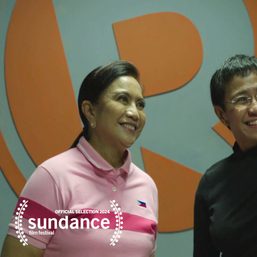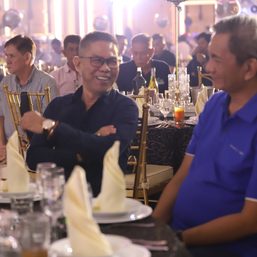SUMMARY
This is AI generated summarization, which may have errors. For context, always refer to the full article.
![[OPINION] Bar exams, failures, and the makings of a great lawyer](https://www.rappler.com/tachyon/2022/04/tl-making-of-a-great-lawyer.jpg)
I failed my first exam in law school. The subject? Constitutional Law under Dean Pacifico Agabin. I spent Civil Procedure trying to keep up with Professor Antonio Bautista’s rapid questioning. I applied for the Law Journal and got rejected. There’s more. Harvard rejected me when I first applied for my masters. As for scholarships, Fulbright didn’t even call me for an interview.
I felt it important to stress these events as I reflected on the post of a fellow lawyer this week. An avid Duterte supporter, the lawyer posted a “reminder” that “Inday Sara passed the Bar Exams on her FIRST try,” and then added a challenge to ask others (“iba”) how many times they had to take the Bar. “Iba” was taken to refer to the Vice President, who never made it a secret that she took the exam twice.
The post tracks previous troll comments that fact checkers have cited for disinformation. It was also ill-timed. The Bar Examination results are due to be released soon. Thousands of law students gripped by anxiety for 2 years were given a reminder of how some in the legal profession give undue importance to what is essentially a “qualifying exam.”
To be sure, the Vice President had addressed the issue since 2016. As one report states, “she had a difficult time juggling her responsibilities as a mother, student, and teacher while preparing for the bar exam.” I am more interested in what she did after encountering failure. And this is what she said, “I strove to recover. And, on the second try, I finally became a lawyer, right on my birthday.”
The lawyer’s post, however, displays the continuing disconnect between what the practice of law aims to be, and the Bar’s limited role in that. As pointed out by the 2020 Bar Examinations chair, Justice Marvic Leonen: “The Bar is merely a qualifying examination. Not a determinant of how good you will be as a lawyer. Certainly, it does not measure your worth as a person.” Still, there are those who, like that Duterte supporter, would misuse the Bar exam as a weapon or a yardstick of “success.”
But what makes a “successful” lawyer? I feel it most important to suggest that “success” is not the absence of failure. Especially in an age where the need to post an ideal picture/persona is becoming compulsive. To be seen as “happy”/“blessed.” To post the trappings of “success”. It’s everywhere. We’ve even coined new phrases like “pleasantly surprised,” “#blessed” or “humble brag.”
Aversion to failure
There is so much aversion to failing, that the slightest trip becomes an irredeemable event. Young people are subtly pressured to be “perfect,” thinking that failure closes doors forever. This is not true. Failure is not a stain. And we should free the youth from the paralysis that the fear of failure induces. Perhaps by being open about how we, too, have faced failures.
I’ve lost track of how many times I’ve failed. But I do know what I did after. Just like the Vice President, I took stock of what I did wrong, gave myself time to recover, and then I tried again (and again). I draw from these experiences whenever I talk about the value of grit. Because failure has been a constant visitor throughout my life. And though I hated him each time we met, over the years, I’ve come to recognize the lessons he gave me. (I still wouldn’t embrace him the next time we meet though).
Of course, there are instances when failure isn’t worth celebrating. Failing to meet a court-required deadline, a level of quality, or to exercise diligence aren’t things we encourage. It is one thing to try your best but, still not achieve the desired result. It is another thing to have millions of ill-gotten wealth, a retinue of assistants, and the diplomatic corps at your call, but still fail to earn an Oxford degree.
What matters is that we learn to celebrate the kind of failures that enable us to grow. Those failures that teach us to fall gracefully and stand up after. We are a product of our failures, more than our victories.
Like “success,” I suggest we should be more deliberate in attaching “greatness.” Perhaps based on what a person has done after earning her Bar license – rather than one’s IQ, government post, or Bar Exam score.
A few years ago, some alumni got worried that the organizers of a job fair had chosen a lawyer whose “fame” is linked to his leading role during Martial Law. The topic was “Great Lawyering,” and the person was a pillar of the dictatorship (and isn’t shy about it). I pointed out that the lawyer was powerful, brilliant, and wealthy. Doesn’t that qualify him as “great”? They countered that maybe that is the problem. A person responsible for so much suffering was being held as an example for “greatness” because of his win record, money, and power.
But what would that alternative be? Is it about being appointed to a high government position? Is it brilliance? But favoring brilliance or power regardless of how they’re applied is the problem. The Lord knows how much this country has suffered under brilliant people. As the columnist Conrad de Quiros once vividly described it, it is “using the law to screw justice.” The late senator Jose W. Diokno (father of Dean and senatorial bet Chel Diokno) points out the difference: “Great lawyers – not brilliant lawyers. A scoundrel may be, and often is, brilliant; and the greater the scoundrel, the more brilliant the lawyer.”
Justice Carpio had been incorporating in his lectures the thought that “lawyering in the grand manner” means bridging the gap between law and justice. That could be a good start. Bringing justice to those who need it the most. Spending decades serving the poor, not politicians or powerful corporations. Inspiring countless others to do the same. Who among those running comes to mind?
The answer is perhaps why Justice Carpio, Justice Carpio Morales and even the eminent Justice Vicente V. Mendoza have publicly endorsed the Vice President. They are joined by past presidents of the Philippine Bar Association, law deans, and other leaders of the legal profession. This is the kind of genuine recognition that most of us lawyers can only dream of.
The Vice President has lived a life worth emulating. She has faced crisis after crisis but never gave up. And beyond that, she has spent decades doing good, serving justice, and being the kind face of the law to the poorest of Filipinos. Her body of work has inspired thousands.
Rather than shaming those who fail, we should encourage our youth to aspire to the same standard. We should tell them: this is what succeeding means. This is what “lawyering in the grand manner” is about. Failure visits everyone. But becoming a great lawyer like the Vice President depends on what we do after. – Rappler.com
John Molo practices commercial litigation and arbitration. He has argued several cases before the Supreme Court. He teaches Constitutional Law in UP Law, where he now chairs the Political Law Cluster. He is a Fulbright Scholar and a past President of the Harvard Law School Alumni Association of the Philippines.
Add a comment
How does this make you feel?
![[OPINION] Sara Duterte: Will she do a Binay or a Robredo?](https://www.rappler.com/tachyon/2024/03/tl-sara-duterte-will-do-binay-or-robredo-March-15-2024.jpg?resize=257%2C257&crop_strategy=attention)
![[New School] Tama na kayo](https://www.rappler.com/tachyon/2024/02/new-school-tama-na-kayo-feb-6-2024.jpg?resize=257%2C257&crop=290px%2C0px%2C720px%2C720px)



There are no comments yet. Add your comment to start the conversation.